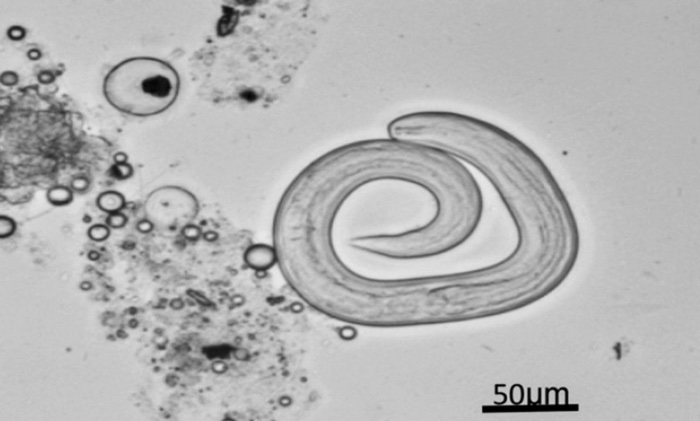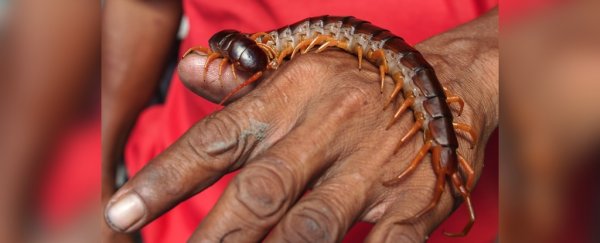Centipedes mean business. They can slay animals 15 times their size, even devour whole snakes if they want.
But the true horror of the centipede may be something else, hiding unseen inside their many-legged forms: a dangerous parasite, which scientists say has never been observed in these segmented critters – until now.
The stowaway in question is the parasitic roundworm Angiostrongylus cantonensis – aka 'rat lungworm' – a food-borne parasite typically found in snails and other mollusks, which has now for the first time been detected in centipedes too.
As for the strange reason we know this? It starts with headaches.
 A. cantonensis (AJTMH)
A. cantonensis (AJTMH)
A 78-year-old woman was admitted to Zhujiang Hospital in the Chinese city of Guangzhou, saying she'd experienced headaches, drowsiness, and cognitive impairment for weeks, although she had no other signs of illness, such as fever or vomiting.
Subsequent examination suggested symptoms of meningitis, but not a viral or bacterial cause for the condition. Her cerebrospinal fluid did however indicate traces of antibodies against the rat lungworm, indicating a diagnosis of A. cantonensis eosinophilic meningitis.
What was unusual was how she'd presumably contracted it: by eating raw centipedes.
While centipedes aren't a common foodstuff for most of us, dried or crushed centipedes have been used in traditional Chinese medicine for centuries (usually consumed in powder form), and live, wild specimens are sold in some Chinese agricultural markets.
In this case, the lady's son had served the fresh produce variety to his elderly mother – and uncooked.
If that sounds unreasonable, don't be too hard on him: he himself turned up at the hospital only a few weeks later, presenting the same symptoms, having shared in the meal.
"We don't typically hear of people eating raw centipedes, but apparently these two patients believed that raw centipedes would be good for their health," says the treating physician, neurologist Lingli Lu from Zhujiang Hospital.
"Instead it made them sick."
Fortunately for mother and son, both patients were ultimately treated successfully with a course of anti-parasitic drugs that rid them of their A. cantonensis infection.
But they were lucky. Cases of Angiostrongyliasis, the infection caused by the roundworm, can cause permanent damage to the central nervous system, and are sometimes fatal.
As for why the pair consumed their centipedes uncooked, according to Lu, the son had been told that eating the arthropods raw could prevent winter colds.
It's not immediately clear if these Chinese marketplaces sell the venomous animals to be consumed raw, or if they're merely offered fresh, so consumers can later boil, pickle, or otherwise cook them.
In any case, Lu says as a matter of courtesy, serving suggestions are not dictated to shoppers at the live centipede stall.
"In my opinion, it would be rude to tell the customer, 'Don't eat them raw,'" Lu told The New York Times.
"It would say the customer is stupid."
To confirm their raw centipede hypothesis, Lu and fellow researchers tracked down the same marketplace the son had previously visited, and subsequent testing revealed seven out of 20 centipedes purchased tested positive for rat lungworm.
So, if you're thinking about serving up raw centipedes for dinner – whether for reasons of immunity boosting, or exotic cuisine – the science is clear.
"Centipedes can act as a transport host of A. cantonensis," Lu told Infectious Disease News.
"We should not eat raw centipedes, as well as other raw animals. We should realise that proper cooking technique is important to protect us from food-borne diseases."
The findings are reported in the American Journal of Tropical Medicine and Hygiene.
